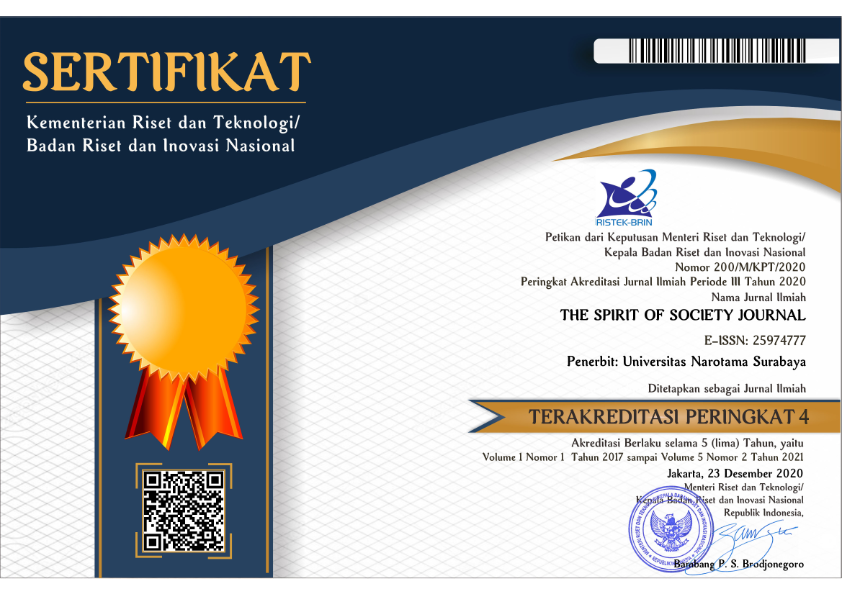Take Advantage of Tourism Development Opportunities Through Hybrid Business Activities in Indonesia
Abstract
This research was conducted in three cities that have the highest number of hybrid entrepreneurs in Indonesia. The approach in this research is to prioritize primary data by looking for facts in the field related to hybrid entrepreneurial activities. The total number of business owners is 73 people spread across Surabaya, Malang, and Denpasar. Where these entrepreneurs have managed to run their business well in a hybrid way for approximately six years. Based on the research we did, we found that there were four main factors supporting their success in running a hybrid entrepreneurship, that is digital promotion, product identity and legality, resource strength, market analysis capabilities. Based on associative analysis and testing, it is proven that these four variables have a significant influence on hybrid entrepreneurial activities. The limitation of our research is that it does not include a wider range of forms or types of variables. It only involves four variables whose strength has been recognized by entrepreneurs in the three cities. The implications of this research activity will be to be able to provide a clear picture of the development of hybrid business activities and what aspects should be considered for someone when they want to start a hybrid entrepreneur. There has never been and there are not many references to research activities that specifically discuss and examine hybrid entrepreneurial activities.
Downloads
References
Alvstam, C. G., & Ivarsson, I. (2014). The ‘Hybrid’Emerging Market Multinational Enterprise - The Ownership Transfer of Volvo Cars to China. In Asian Inward and Outward FDI (pp. 217-242). Palgrave Macmillan, London.
Antara News, (2021). Peran Perempuan Dalam UMKM Di Indonesia Sangat Besar. 11-10-2021. Retrieved from: https://www.antaranews.com/berita/2451669/peran-perempuan-dalam-umkm-di-indonesia-sangat-besar. Diakses tanggal 11-10-2021.
Barinaga, E. (2014). Microfinance in a developed welfare state: A hybrid technology for the government of the outcast. Geoforum, 51, 27-36.
Berge, L. I. O., Bjorvatn, K., & Tungodden, B. (2015). Human and financial capital for microenterprise development: Evidence from a field and lab experiment. Management Science, 61(4), 707-722.
Bicho, M., Nikolaeva, R., Lages, C., & Ferreira, F. A. (2017). Exploring the Success Factors of Hybrid Micro-Enterprises. In Academy of Marketing Science World Marketing Congress (pp. 177-188). Springer, Cham.
Byun, H., Raffiee, J., Ganco, M., (2019). Discontinuities in the Value of Relational Capital: The Effects on Employee Entrepreneurship and Mobility. Organization Science. 30(6). https://doi.org/10.1287/orsc.2018.1262.
Brewer, J., & Gibson, S. W. (Eds.). (2014). Necessity entrepreneurs: microenterprise education and economic development. Edward Elgar Publishing.
Ciambotti, G., & Pedrini, M. (2021). Hybrid harvesting strategies to overcome resource constraints: Evidence from social enterprises in Kenya. Journal of Business Ethics, 168(3), 631-650.
Dewanti, R., Melati, I., & Simbolon, F. (2013). Pengembangan Model Daya Saing UMKM Batik Melalui ECS. Binus Business Review, 4(1), 41-57.
Ferine, K. F., & Indrawan, M. I. (2021). Analisis Pengaruh Keunggulan Bersaing dan Motivasi Terhadap Kinerja UKM Binaan Bank Sumut Cabang Kampung Baru Medan. Prosiding Konferensi Nasional Ekonomi Manajemen dan Akuntansi (KNEMA), 1(1).
Firmansyah, M. A. (2020). Pengantar E-Marketing. Penerbit Qiara Media.
Folta, T. B., Delmar, F., & Wennberg, K. (2010). Hybrid entrepreneurship. Management science, 56(2), 253-269.
Grassl, W. (2012). Business models of social enterprise: A design approach to hybridity. ACRN Journal of entrepreneurship Perspectives, 1(1), 37-60.
Hatta, I. H. (2014). Analisis pengaruh inovasi, pengambilan resiko, otonomi, dan reaksi proaktif terhadap kapabilitas pemasaran UKM kuliner daerah di Jabodetabek. Jurnal Manajemen Pemasaran, 8(2), 90-96.
Jan, S. F., (2013). Financing microenterprises: creating a potential value-based hybrid model for Islamic microfinance. International Journal of Management and Business Research, 2(2), 108-122.
Johanson, J. E., & Vakkuri, J. (2017). Governing hybrid organisations: Exploring diversity of institutional life. Routledge.
Mahendra, R., (2016). Key Performance Indicators dalam ISO 9001. 18-04-2016. Retrieved from https://isoindonesiacenter.com/key-performance-indicators-dalam-iso-9001/. Diakses tanggal 01 Nopember 2021.
Malabay, M., Gamal, G., & Viter, J. (2016). Pemodelan Terapan Teknologi Informasi melalui Produk Kreatif sebagai Upaya Inspirasi dan Inovasi USAha Mikro Kecil Menengah. In Seminar Nasional Multi Disiplin Ilmu Unisbank 2016. Stikubank University.
Permana, S. D. H. (2019). Analisis Hasil Improvisasi SEO dengan Metode Hybrid Modified MCDM untuk Peningkatan Peringkat Dan Trafik Kunjungan Website UMKM. Jurnal Sisfokom (Sistem Informasi dan Komputer), 8(1), 85-91.
Putri, S. L., (2020). Penyebab Kegagalan Produk Hybrid. Retrieved from: https://manajemen.unidha.ac.id/2020/05/20/asinkron-mandiri-penyebab-kegagalan-produk-baru-hybrid-unidha/. 20-05-2020. Diakses tanggal 11-10-2021.
Raharja, S. U. J., & Natari, S. U. (2021). Pengembangan Usaha Umkm Di Masa Pandemi Melalui Optimalisasi Penggunaan Dan Pengelolaan Media Digital. Kumawula: Jurnal Pengabdian Kepada Masyarakat, 4(1), 108-123.
Romdonny, J., & Rosmadi, M. L. N. (2018). Peran Media Sosial Dalam Mendukung Pemasaran Produk Organisasi Bisnis. Ikra-Ith Ekonomika, 1(2), 25-30.
Santoso, S.,(2015). Mengukur Sikap dan Kepuasan Konsumen. Elex Media Komputindo, Jakarta.
Santos, F., Pache, A. C., & Birkholz, C. (2015). Making hybrids work: Aligning business models and organizational design for social enterprises. California Management Review, 57(3), 36-58.
Sulistyowati, Y., & Harsono, S. U. (2021). Pola Pemasaran Sambal Tradisional Chilia di Purwodadi Menembus Pasar Internasional (Doctoral dissertation, Universitas Muhammadiyah Surakarta).
Sutrisno, T. F., Effendy, J. A., & Prathivi, M. D. (2019). Hybrid Strategy Study: The Role of Entrepreneurial Orientation and Total Quality Management in MSMEs. Jurnal Manajemen dan Kewirausahaan, 7(2), 124-131.
Solesvik, M. Z. (2017). Hybrid entrepreneurship: how and why entrepreneurs combine employment with self-employment. Technology Innovation Management Review, 7(3). 33-41. https://doi.org/10.22215/timreview1063
Tykkyläinen, S., & Ritala, P. (2021). Business model innovation in social enterprises: An activity system perspective. Journal of Business Research, 125, 684-697.
Wijoyo, H., Cahyono, Y., Ariyanto, A., & Wongso, F. (2020). Digital economy dan pemasaran era new normal. Insan Cendekia Mandiri.
Copyright (c) 2022 THE SPIRIT OF SOCIETY JOURNAL : International Journal of Society Development and Engagement

This work is licensed under a Creative Commons Attribution-ShareAlike 4.0 International License.












